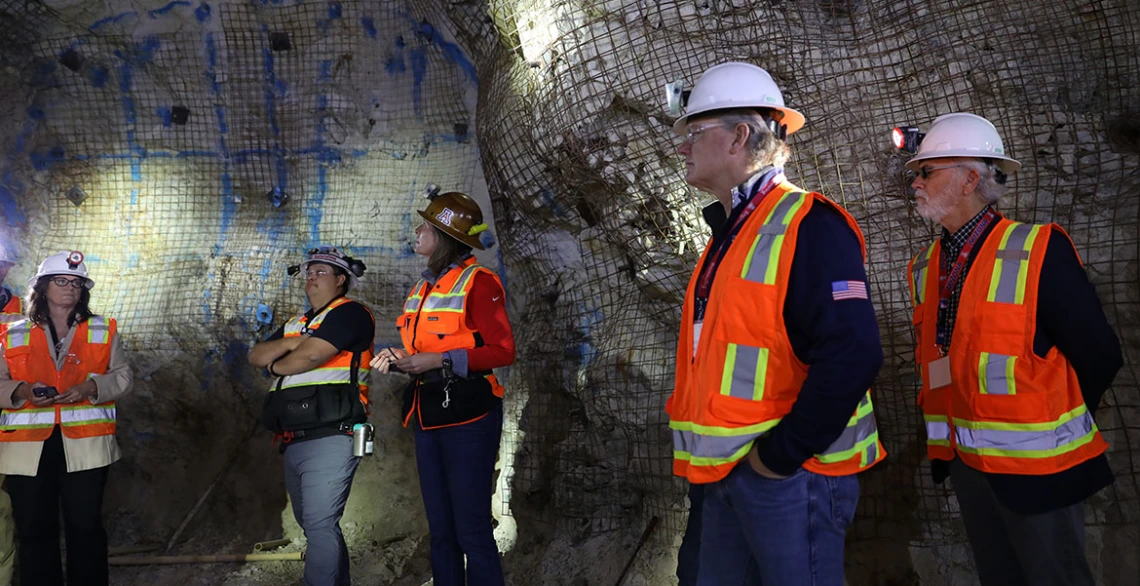Congressional Western Caucus Tours San Xavier Underground Mining Laboratory
Rep. Juan Ciscomani of Arizona hosted fellow caucus members and congressional staff to showcase the University of Arizona's excellence in the areas of mining and critical minerals.

Kray Luxbacher, Gregory H. and Lisa S. Boyce Leadership Chair of Mining and Geological Engineering and MGE department head, speaks inside the new mine of the San Xavier Underground Mining Laboratory as a crowds, including Reps. Bruce Westerman of Arkansas and Mike Collins of Georgia, listen.
Members of the Congressional Western Caucus heard from students, University of Arizona leaders and industry partners about challenges facing the mining industry, and the UA research initiatives and training programs preparing future miners to address them.
The lawmakers visited the university's San Xavier Underground Mining Laboratory on Feb. 9. The day before, the delegation visited the U.S.-Mexico border.
University of Arizona President Robert C. Robbins and U.S. Rep. Juan Ciscomani, from Arizona's 6th Congressional District, hosted Congressional Western Caucus Chairman U.S. Rep. Dan Newhouse of Washington and House Natural Resources Committee Chairman U.S. Rep. Bruce Westerman of Arkansas, along with several Western Caucus members and more than 40 congressional staff members.
Attending the trip with Westerman, Newhouse and Ciscomani were U.S. Rep. Pete Stauber of Minnesota, U.S. Reps. Buddy Carter and Mike Collins of Georgia, U.S. Rep. Harriet Hageman of Wyoming, and U.S. Rep. James Moylan of Guam.
After hearing remarks from Robbins, students and faculty members, the delegation donned hard hats and descended 150 feet into the university's San Xavier mine, the only student-run multilevel mine in the United States with a working vertical shaft.
"We were proud to be able to share this incredible University of Arizona asset with the Congressional Western Caucus delegation, and I thank Chairman Newhouse and Rep. Ciscomani for their support and interest," Robbins said. "The university is primed to pioneer the future of domestic critical mineral production, processing and recycling, as well as produce high-quality, prepared graduates who are ready to join the nation's mining workforce."
Mining was one of the first two programs offered by the University of Arizona, and the Department of Mining and Geological Engineering has been synonymous with the university's land-grant mission since its founding in 1885. Today, the UA mining and geological engineering program, housed within the College of Engineering, is the only one in the state and one of only 14 in the nation. The program consistently ranks in the top five nationally and remains a research powerhouse.
The San Xavier mining lab – located in Sahuarita, Arizona, about 15 miles south of Tucson and 50 miles north of the border – includes a classroom and other educational resources. Older parts of the mine offer historical context and hands-on learning opportunities for students.
University staff and students described multiple research projects that are currently underway. In addition to running the working San Xavier mine, mining engineering students hold multiple internships with mining, petroleum and gas companies.
Driving New Domestic Approaches
Arizona produces 74% of the nation's copper, but the U.S. supply chain around critical minerals and other minerals required for decarbonization – including copper – has reached a crucial point. While the U.S. has several ore deposits that may meet demand, challenges around processing and refining of battery and critical minerals remain problematic, and these activities are routinely outsourced to other nations.
Drawing on UA strengths, the School of Mining and Mineral Resources – jointly administered by the College of Science and the College of Engineering – unites students, professionals and communities across disciplines and boundaries to meet the complex challenges of sustainability to make a safer, cleaner domestic mineral supply chain.
“The school will transform approaches to sustainable mining, and work with communities and industry partners to develop innovative best practices for responsible production and sustained reuse of mineral resources. We were delighted to host the Congressional Western Caucus and discuss ways to advance these important goals,” said David W. Hahn, the Craig M. Berge Dean of the College of Engineering.
The caucus primarily works to advance economic growth, national energy security, local stewardship of environment and natural resources, and policies that promote safe domestic agriculture and healthy forests. It has more than 100 members, including Ciscomani, whose office helped coordinate the visit with two university offices, Government and Community Relations and Research, Innovation and Impact.

